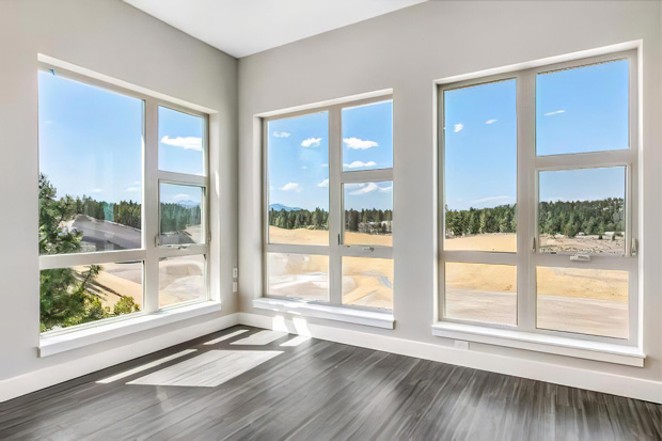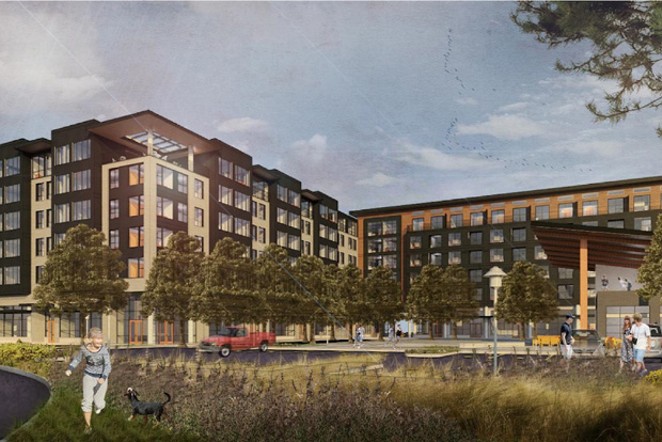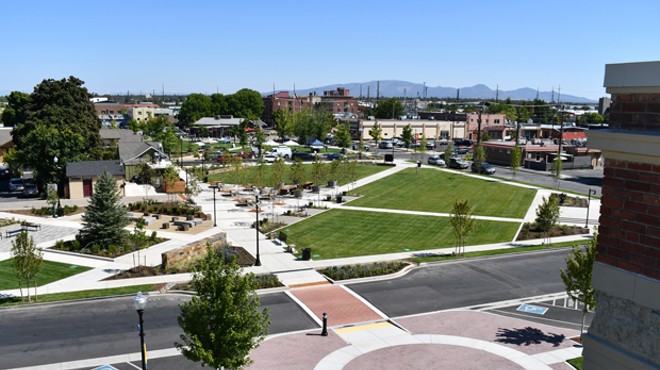"It's quite extraordinary. Home sale prices increased by 15% just this summer. Historically, it's 7% to 9% a year," said Brian Ladd, a principal agent at Cascade Sotheby's. Ladd grew up in the real estate industry and has been a broker for the past 20 years.
"People are panic buying. I've never seen anything like this," he said.
As white-collar workers living in prosperous cities were advised to work from home to prevent the spread of the coronavirus pandemic, they were simultaneously isolated from many of the experiences that make city living worthwhile: theater, live music, unique restaurants, public transportation.
In contrast, Bend's COVID-safer outdoor amenities offer refuge and relief. Many former city-dwellers moved to Bend this summer after making same-day offers on houses sight unseen, Ladd said. Others have happily handed over cash for high-end luxury apartment rentals, which are cheaper than rentals in Seattle or San Francisco.
This demand drives up prices for local renters and buyers. If they're living on Bend's area median income, finding an affordable place to live just got a lot harder. The median income for a family of four in Bend in 2019 is $78,600, according to the U.S. Department of Housing and Urban Development. (It does not produce statistics for single people, but instead adds together the incomes of everyone in a four-person household.)
After adjusting for the cost-of-living, the median annual earnings for full-time workers in the Bend area is $48,467, according to Smartest Dollar.While skyrocketing home values and rising rents may be cause to celebrate for some Bend property owners—and for those who see it as a path to relative economic stability for Bend—the housing market is just one of many indicators demonstrating the deepening chasm between the haves and the have nots during the coronavirus pandemic.
"What we're seeing now is how COVID has affected people both economically and health wise where people of lower income, people of color, they're hit so much harder than the middle class," said Lynne McConnell, the affordable housing manager for the City of Bend. "How are we as a civilization going to ensure that we have space for folks, for essential workers? This need is exacerbated by the wildfire evacuees."
Locals' lament
Justin Serna has lived in Bend on and off since 1987, while also bouncing around to cities including San Francisco and New York. For the past four years, Serna lived in the same rental house on Bend's west side. Last month, Serna heard from his East-Coast landlord that he was selling. Serna and his girlfriend have to be out by the end of the year. Serna works for Mountain Modern Airstreams and is a professional mountain bike guide, so he said his one "must-have" is garage or storage space for "toys and tools."
Decades in Bend mean he's well connected, often finding "unique and fun" owner-managed properties throughout the years, including this last one. Finding places through friends of friends is a way to circumvent the chaotic mayhem of the local rental market, influenced by the desires of tourists and people moving in from out of town.
But, this time, Serna's inside connections—even his friendship with a local property manager—have turned up very little. The statewide moratorium on evictions, combined with a spike in demand from the coronavirus-inspired urban exodus means there's "just very little out there," he said.
He did find one house 25% above his monthly budget, but when he arrived to look at it, 20 people were already ahead of him.
"The competition is high. People are asking you to make three times your monthly rent," he said. "That, and you have to have first and last, plus deposit. For me, that'd mean $5,000 up front."
If he found a house for $2,000 a month (which he so far hasn't), he'd have to prove he made $6,000 a month.
"Bend is a really desirable place to live, that’s why there’s supply shortages and housing is so expensive. People come here with cash. What is the City supposed to do about that? It’s a free market. I think we’ve done an incredible job given those forces."—Bruce Abernethy
tweet this
"The majority of people that are now paying the higher-end rents are working remotely," he said, noting he's met a flood of newcomers in this category through work. "The job market does not support the amount of rent that people are paying here. It's almost cheaper to find a house and buy it at this point: You'll pay less for your mortgage than you will in rent."
That is of course, if you happen to have $100,000 lying around—the 20% down payment often needed for a $530,000 house. That's the current median home price in Bend, the highest in the city's history, according to the September 2020 Beacon Report.
What affordability looks like
Even in 2019, the Central Oregon Regional Housing Needs Assessment showed that more than half of renters in Deschutes County spent more than 30% of their income on housing and just over a quarter spent more than 50%.
The U.S. Department of Housing and Urban Development considers people who pay over 30% of income on rent as "rent burdened," and people who pay over 50% of their income on rent as severely rent burdened.
As rental costs continue to skyrocket, renters with Bend-based jobs are increasingly priced out. To afford a monthly rental payment (with electricity/sewer/water etc.) of $1,000 a month, renters would have to earn an income of $40,000 a year, earning about $20 an hour for a 40-hour work week. For those making $11/hour, that would require a 70-hour work week to afford the same apartment.
But the average Bend renter makes $14 an hour, according to the RHNA report, and many workers dubbed "essential" during the pandemic, including medical workers, grocery store workers and those in the service industry, make between $15 and $20 an hour, according to the Oregon Employment Department. An essential worker at St. Charles Bend who earns $15 an hour could afford $800/month in rent by HUD standards, for example.
"Bend has a solid workforce, but for the people that are facing housing insecurity, their brainpower often becomes focused on where they are going to be living, when instead they could be benefitting their employer, improving their health or working on their business," said McConnell, the City's affordable housing manager.
Post-COVID outbreak statistics on occupancy rates and average rents in Bend do not yet exist. HUD published its last report in 2018 on the Bend/Redmond region. At that time, the vacancy rate was 4%, with a two-bedroom going for $1,032. Multiple sources said they believed the current vacancy rate is below 1%.
Apartment Hunt
I found almost nothing in that price range ($1,000/month) during a recent search for apartments in Bend on Craigslist, save for one older, first-floor two-bedroom off Brosterhous Road near Fred Meyer.
Most two-bedrooms were in the $1,500-$2,000 range with many new listings disappearing within days. The first 20 listings were taken up by people posting ads looking for a place to live. The rest were dominated by advertisements from newly built luxury apartments or high-priced boutique living spaces, some of which could have been rented on Airbnb pre-COVID.

Some examples I found: $1,700 for a one-bedroom near Hillside Park, $1,495 for a "spacious" apartment on the east side, $3,500 for a three-bedroom house near the Old Mill District, $1,570 for a 933-square-foot apartment near Pilot Butte and $1,900 for an accessory dwelling unit on Bend's west side. The market was almost just as tight in Redmond, where $1,635 for a 1,065-square-foot "luxury" two-bedroom was commonplace.
The Hixon at Westside Yard Apartments (near the old Ray's Food Place) went on the rental market in mid-June with 203 vacancies. It was filled by Sept. 1, according to its website. Units rent from $1,300 (studio) to $2,650 (spacious two bedroom with four windows).
The landlord's view
Brandi Snow runs Partners Property Management & Sales in Bend and is the president of the Central Oregon Rental Owners Association. She said her company, which manages between 200-250 properties, has zero vacancies.
"It's at an all-time low. Because of the state's moratorium on evictions, people can't move out. Tenants have no reason to vacate, no reason to pay. So if people don't move out, and if people aren't buying new houses to rent out, there's no availability," she said.
Snow said numerous owners she manages for have been selling off their rental properties.
"Not just because the market is hot, though that's a factor, but because of the uncertainty. There's a lot of risk right now," she said.
Snow said the state's moratorium on evictions has made it harder for owners to demand compliance with rental agreements. If a complaint ends up in court, judges are more likely to side with tenants in the age of the coronavirus, she said.
Further adding to a property owner's risk was SB 608, a tenant's rights bill passed last year, which makes no-cause evictions after one year illegal. While owners can still kick tenants out for nonpayment or "outrageous conduct," the new law requires landlords to pay one month of a tenant's rent if the eviction is caused by the owner's decision to sell or fix up the property, for example.
Snow explained that the law has motivated many owners to evict tenants after a year in order to shield themselves from the potential liabilities called for in the new law. It also may encourage landlords to hike rents by inflation plus 7% every year—the maximum amount an owner can increase rent per year under SB 608.
The housing shortage
Brian Ladd with Cascade Sotheby's explained that while the market was hot during the last housing boom, this time it's more dramatic. Most houses have multiple offers, and some have 20 or more offers, he said. One reason: the severe shortage of inventory.
"At least during the boom there was more building activity," he said. "Even with the recent urban growth boundary expansion, building in Bend is still way below its peak in the mid 2000s."
Adding to the shortage is the fact that there was very little building in Bend at all between 2008 and 2016 as the city struggled to get a new UGB expansion approved by the state, Ladd explained.
The available housing supply and how long it will last is another vital statistic real estate experts use to read the market.
"Even at the height of the boom in 2005 and 2006, you had six months of inventory, 180 days," Ladd said. "But now we have 19 days, less than three weeks. There's a massive housing shortage; very few homes with no excess inventory."
Faith in the free market
"Bend is a really desirable place to live, that's why there's supply shortages and housing is so expensive," said Bruce Abernethy, Mayor Pro Tem, and Bend mayor at the time of the first UGB proposal. "People come here with cash. What is the City supposed to do about that? It's a free market. I think we've done an incredible job given those forces. The City of Bend has brought more affordable housing online than any other city besides Portland."

Bend was the first city in the state to implement an affordable housing fee in 2006 and it has funded 770 units so far. But the community needs thousands more.
"We will never be able to buy our way out of this," McConnell said. "The regional housing analysis shows a need for housing units at every income level. It is very challenging, arguably impossible, to build as quickly as our community is demanding it."
The Regional Housing Needs Analysis published by the state and ECONorthwest in August 2020 demonstrated that during the next 20 years, the Deschutes region will need nearly 50,000 new housing units, with 4,837 currently under production. Of this amount, 89% of the new housing need is related to population growth.
Legislating our way out of this?
During the short session this winter, Gov. Kate Brown introduced HJR 203 to change the Oregon Constitution to allow the state to establish a real estate sales tax. (Eight years ago, Oregon voters outlawed a transfer tax, even though most other states have one.) Brown's measure would have excepted the first $500,000 of a property's value and the new revenues would fund affordable housing. The proposal died along with everything else scheduled for the short session this February, after Republicans walked out in protest of climate change legislation.
The state could also reduce its tax deduction for mortgage interest payments and use the funds to build affordable housing. Right now, the deduction costs the state $500 million annually and primarily benefits the upper class, according to the Oregon Center for Public Policy.
Eileen Kiely, a Democrat running for Oregon's Senate District 27 to replace Sen. Tim Knopp (R-Bend), told the Source during a candidate endorsement interview that she's interested in using property tax reform to address the local housing crisis.
"We have property tax equity issues. Measure 47 really exacerbated them: Two houses right next to each other could pay $1,000 more or less than the other," Kiely said.
Measure 47, passed in 1996, reduced property tax increases in the state to 3% per year. It helps people who live in a hot real estate market from getting buried by taxes as their home value spikes. But Kiely questions the need to provide the same break for those who own a second home or vacation rental.
"We have a lot of housing here taken up by tourism because it's very profitable," she said. "If we were to make more of that available for long-term housing, that would go a long way towards our shortage. It's not equitable to give vacation homes the same property tax breaks as a long-term rental or primary residence. Let's stop subsidizing what we don't want to encourage."
Update: This article was updated on Oct. 8, 2020 to reflect median earnings for Bend's full-time workers.




























